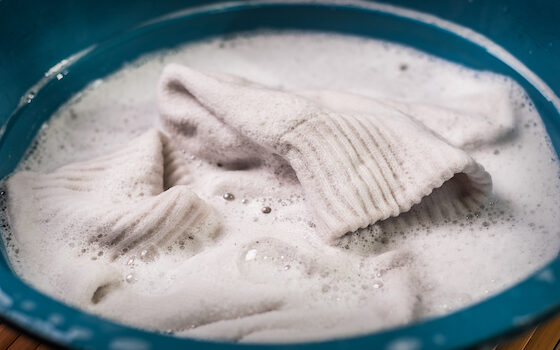What is Dirty Sock Syndrome and How Can You Avoid It ?
What is “Dirty Sock Syndrome”? Dirty Sock Syndrome is caused by bacteria growing on HVAC system coils, and refers to the unpleasant odor that comes from your residential or commercial heat pump coils.
ACHR News (Air Conditioning | Heating | Refrigeration) links DSS to these three main causes:
“Cooling coils and other AC components are not made in sterile environments, meaning that microbes cover all of their parts along with a small amount of lubricant.”
“During the first cooling event after installation, condensate brings life to the microbes, which initially use the lubricant as an initial food source.” Microbial decay (better known as “rot”) is the culprit of the foul stench that smells like a dirty sock.
Did you know? According to ASHRAE coil cleaning can save 10-25% of operation costs!
During certain times of the year when a heat pump may warm in the morning hours and then cool at noon and/or later hours, the system can produce condensate from noon onward, fueling growth for up to 16 hours – only to release odors and toxins during the next morning’s warming hours. Heat pump coil temperatures are often not sufficient to kill proliferating microbes. Those that may die simply serve as a future food source for continued proliferation.
How Can You Get Rid of Dirty Sock Syndrome?
The best way to get rid of the musky aroma is by thoroughly cleaning the coils in the HVAC system.
Our first step is always to schedule an on-site visit to take a look at the setup and size of the air handler unit. We also take this opportunity to check for any visible mold growth in the ductwork.
The second step is the “full system and evaporator coil cleaning, which involves: flushing the coils, determining the cause of the syndrome, as well as the cleaning and/or applying a sealant.
How Can You Avoid Dirty Sock Syndrome in the Future?
The best way to avoid dirty sock syndrome from occurring in the first place is to ensure that your HVAC system is serviced on a regular basis. After all, a good offense is always the best defense – even if the syndrome has already occurred, a thorough cleaning can prevent the problem from happening again.
Call 800-482-8224 to schedule an appointment with an Amazon Air Duct Cleaning Professional today!
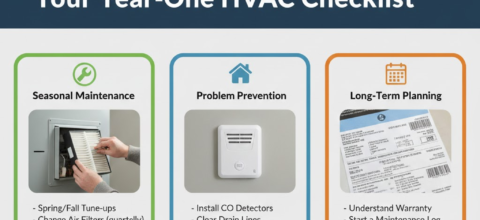
Congratulations on your new home! Between unpacking boxes and picking paint colors, your HVAC system probably isn’t top of mind. But a little attention now can save you from surprise repair bills later. If you’re a first time home buyer figuring out what to do with hvac equipment, this guide breaks down the basics for your first 12 months. Most of these tasks are
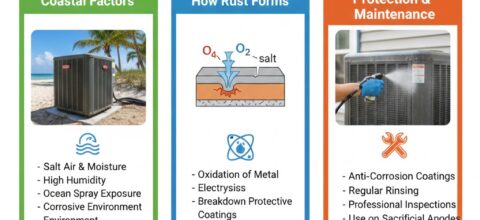
Living near the coast comes with great views and ocean breezes. But salt air brings a hidden problem. It’s constantly corroding your outdoor AC unit. If you’ve spotted rust on your condenser or noticed your cooling performance dropping, salt damage might be the reason. Here’s what’s happening and what you can do about it. What Happens When Salt Gets Into Your Air Conditioner Your
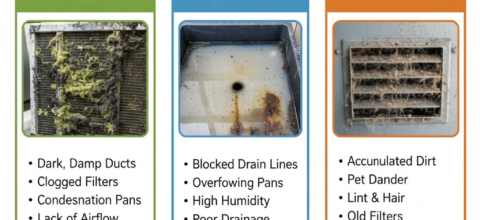
You turn on the heat or AC and suddenly there’s an odor you can’t ignore. Sometimes it’s damp and musty. Other times it smells like something burning. You might not be able to describe it exactly, but you know something’s off. Different smells mean different things. Some are harmless. Others need immediate attention. Here’s how to figure out what you’re dealing with. Why Does
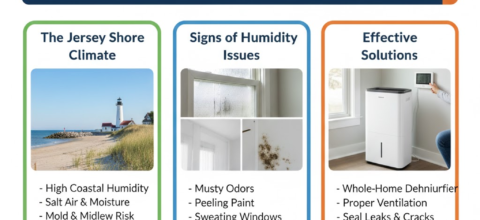
Beach living comes with perks. You get ocean views, morning walks on the sand, and that salt air. But if you own a home in Ocean County, you know the weather can take a toll on your home. Humidity gets into everything and won’t leave. Maybe you’ve noticed your windows fogging up even though the AC is on. Or there’s a smell in the

Ever stood in the filter aisle at the hardware store feeling completely lost? MERV 8, MERV 11, MERV 13. The numbers keep climbing, and so do the prices. You grab one and hope it’s right. Turns out, the most expensive filter isn’t always the best choice. Sometimes it can cause problems. Let’s figure out what these ratings mean and which one belongs in your

Congratulations on your new home! Between unpacking boxes and picking paint colors, your HVAC system probably isn’t top of mind. But a little attention now can save you from surprise repair bills later. If you’re a first time home buyer figuring out what to do with hvac equipment, this guide breaks down the basics for your first 12 months. Most of these tasks are

Living near the coast comes with great views and ocean breezes. But salt air brings a hidden problem. It’s constantly corroding your outdoor AC unit. If you’ve spotted rust on your condenser or noticed your cooling performance dropping, salt damage might be the reason. Here’s what’s happening and what you can do about it. What Happens When Salt Gets Into Your Air Conditioner Your

You turn on the heat or AC and suddenly there’s an odor you can’t ignore. Sometimes it’s damp and musty. Other times it smells like something burning. You might not be able to describe it exactly, but you know something’s off. Different smells mean different things. Some are harmless. Others need immediate attention. Here’s how to figure out what you’re dealing with. Why Does

Beach living comes with perks. You get ocean views, morning walks on the sand, and that salt air. But if you own a home in Ocean County, you know the weather can take a toll on your home. Humidity gets into everything and won’t leave. Maybe you’ve noticed your windows fogging up even though the AC is on. Or there’s a smell in the

